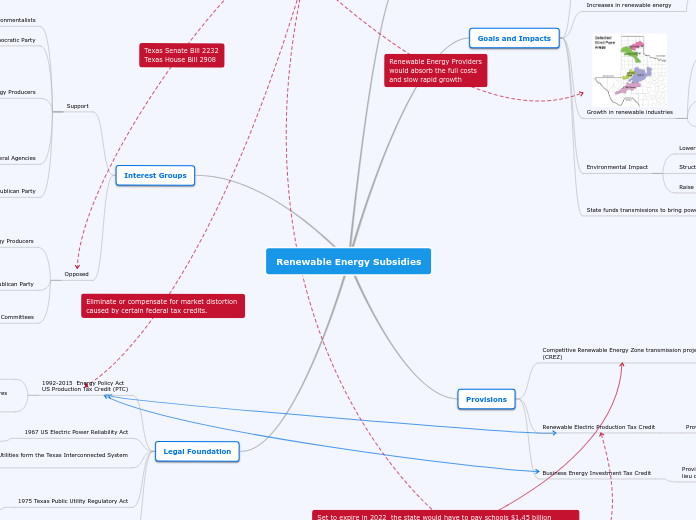Renewable Energy Subsidies
Goals and Impacts
Increase in energy choices
Market competition
Lower energy bills for customers
Threatens existing energy producers
Loss of Jobs in aging power sources
Creates declining prices for energy
Reduce the incentive to invest in new power plants

Increases in renewable energy
Some renewable energy production is unreliable

Growth in renewable industries
Jobs
Companies involved in installation of generators
Support staff of the energy generators
Construction of transmission line
Income for land owners in the form of leases or royalties
Corporations pay taxes to local economies in the form of property taxes
Environmental Impact
Lower Carbon Dioxide emissions
Structures change the Texas Landscape
Tall structures create "wind shadows"
Raise the surface temperatures of the earth
State funds transmissions to bring power to customers
Provisions
Competitive Renewable Energy Zone transmission project
(CREZ)

1996-2005 3,600 miles of high-voltage transmission lines installed to better connect energy grids
Renewable Electric Production Tax Credit
Provides Tax incentives to Renewable Energy Producers
Chapter 312 abatements exempt all of part of the increase in property value from taxation for as long as a decade
Chapter 313 abatements limit taxes for 10 years for school district maintenance and operations in exchange for property improvements and job creation
Business Energy Investment Tax Credit
Provides businesses with a 30% investment tax credit (ITC) in lieu of the PTC
State Rejects Tax Subsidies for Renewable Energy
Interest Groups
Support
Environmentalists
Sierra Club
Democratic Party
Environmentally minded Legislators
Alternative Energy Producers
Solar
Wind
Hydro
Biomass
Federal Agencies
Environmental Protection Agency
Department of Energy
Republican Party
Rural Legislators
Opposed
Traditional Energy Producers
Oil
Natural Gas
Coal
Republican Party
Fiscally Minded Legislators
Conservative Political Action Committees
Texas Public Policy Foundation
Empower Texans
Legal Foundation
1992-2015 Energy Policy Act
US Production Tax Credit (PTC)
Renewable electricity production tax credit (PTC) is a per-kilowatt-hour (kWh) tax credit
Between 2018 and 2022, under current law, tax expenditures for the renewable electricity PTC are estimated to
be $25.8 billion.
1967 US Electric Power Reliability Act
1968 Creation of North American Energy Reliability Corporation (NERC)
1941 Electric Utilities form the Texas Interconnected System
(TIS)
1970 TIS forms Electric Reliability Council of Texas
(ERCOT) to comply with NERC requirements
2002 ERCOT operates the grid
which connects Texas power producers
1975 Texas Public Utility Regulatory Act
Creation of the Public Utility Commission
(PUC)
1999 PUC oversees competitive retail markets of electricity
2005 Texas Senate Bill 20 PUC in consultation with the ERCOT to designate competitive renewable energy zones (CREZ)
1999 Texas Senate Bill 7
Deregulation of energy market
